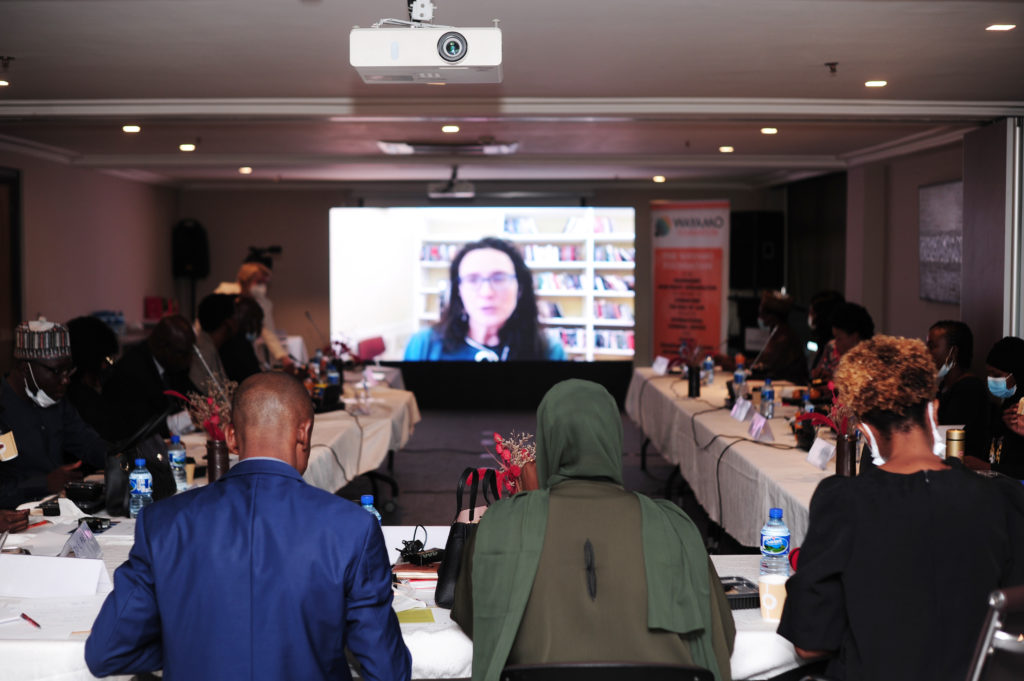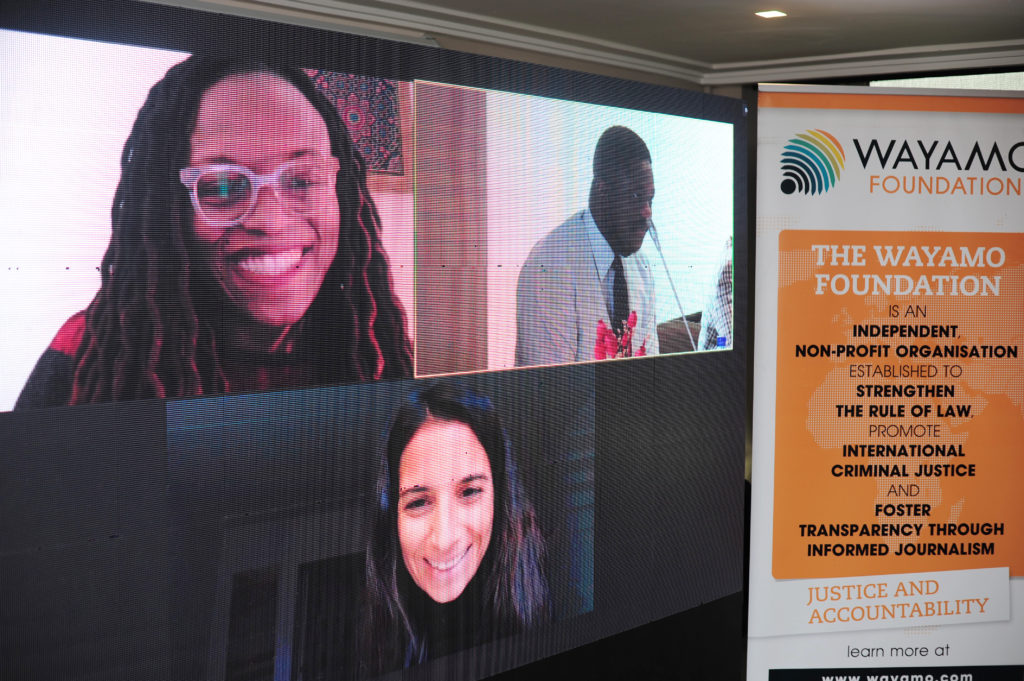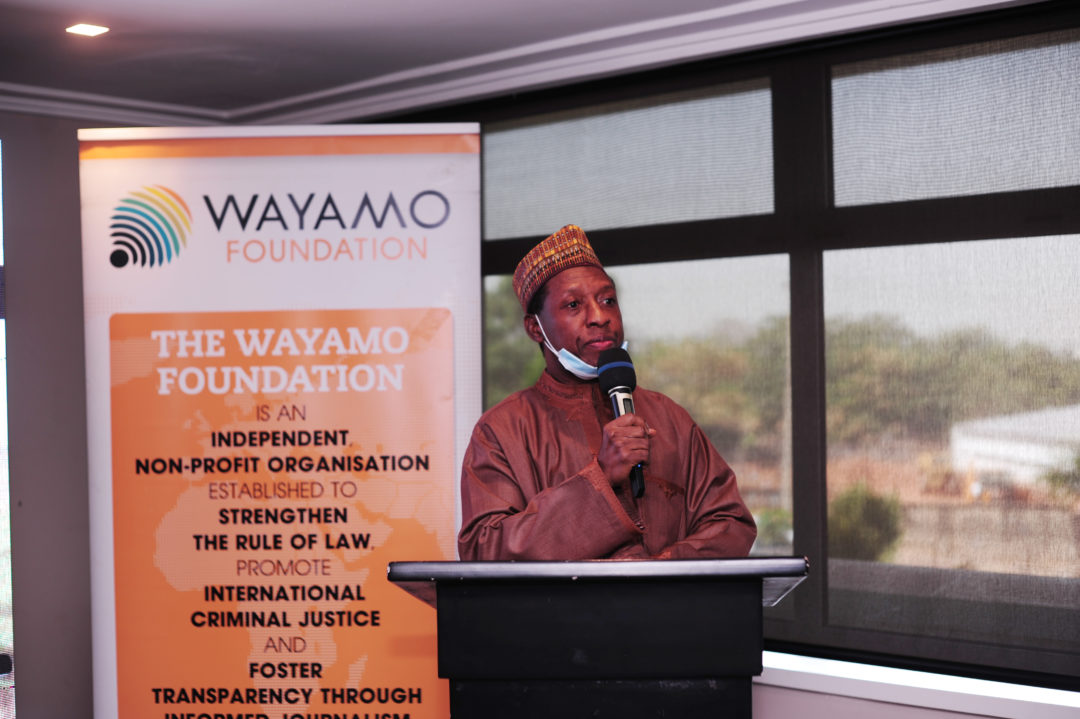On 4 February 2021, the Wayamo Foundation and the Nigerian Institute of Advanced Legal Studies (NIALS) held their first joint international criminal law (ICL) and international humanitarian law (IHL) course in Abuja, Nigeria.
The main objective of this course –and those to follow– is to further equip Nigerian institutions with the necessary skills and knowledge to train their network of legal practitioners and relevant actors in ICL and IHL. Wayamo and NIALS’ philosophy is to combine the provision of knowledge with a ‘Train-the-Trainer’ component, with knowledge and delivery being seen as a package.
COVID-19 made the execution of the course more difficult, but not impossible. In October of last year, the Wayamo Foundation developed a new workshop model and tested it in Abuja, which combined in-person sessions with pre-recorded lectures, and Zoom Q&A sessions between online experts all over the world and the participants based in Abuja. The same model was successfully used again this time around.
The meeting was personally attended by members of three different institutions, namely, NIALS, the Complex Casework Group (CCG) and the International Law Department of the Ministry of Justice, and the National Judicial Institute. A limit was placed on the number of participants per institution, in order to ensure that social distancing regulations would be observed throughout the course.
The event was officially opened by Wayamo Director, Bettina Ambach, and by NIALS Director-General, M.T. Ladan. These the opening remarks were followed by two pre-recorded lectures: Dapo Akande, Professor of Public International Law, University of Oxford, delivered an ‘Introduction to international criminal law’, and then joined the session via Zoom to answer participants’ questions; and Sarah Nouwen, Professor of International Law at the European University Institute, Florence (on leave from the University of Cambridge), spoke on ‘The International Criminal Court (ICC) and the principle of complementarity’, an issue particularly relevant to Nigeria in light of the December 2020 decision of the Office of the Prosecutor (OTP) of the ICC to seek authorisation to open an investigation in Nigeria.

Sarah Nouwen, Professor of International Law at the European University Institute, Florence (on leave from the University of Cambridge), spoke on ‘The International Criminal Court (ICC) and the principle of complementarity’
After a short coffee break, Linda Bore, International Justice lawyer at Wayamo, joined participants via Zoom to discuss ‘The fundamentals of international humanitarian law’. The focus shifted back to Abuja as Charles Adeogun-Phillips, Partner at Charles Anthony LLP and Former Lead International Prosecutor, took the podium to discuss ‘International fair trial standards: defendant’s rights during criminal proceedings’.
The afternoon kicked off with Claus Molitor, OTP Situation Analyst, talking to participants via Zoom about the current state of the relationship between the ICC and Nigeria. The last session of the day consisted of a pre-recorded lecture by Sofia Candeias (UN Team of Experts on the Rule of Law and Sexual Violence in Conflict, Office of the Special Representative of the Secretary-General on Sexual Violence in Conflict) on the investigation and prosecution of conflict-related sexual violence, followed by a live Zoom Q&A session during which Sofia Candeias was joined by Adejoké Babington-Ashaye, International Law Specialist and former investigator at the ICC.

Sofia Candeias (UN Team of Experts on the Rule of Law and Sexual Violence in Conflict, Office of the Special Representative of the Secretary-General on Sexual Violence in Conflict) and Adejoké Babington-Ashaye (International Law Specialist and former investigator at the ICC) joined the workshop.
The course was received very positively, being alternately described as ‘stimulating’, ‘excellent’, ‘insightful’, ‘educative’, ‘eye opening’ and ‘much needed’. One participant went as far as to describe the course as ‘the best Wayamo training I have attended so far’, while another summed up his experience as ‘theoretically and practically relevant, and delivered by a very cerebral and competent faculty’. Perhaps the single most inspiring comment, however, was to the effect that, ‘this training is great, not just as a means of sensitising stakeholders. It also serves as a call to service to every individual in attendance.’ Seemingly, the only shortcoming (mentioned more than once) was the fact that the course could have been extended over a longer time frame. A number of participants thus encouraged NIALS and Wayamo to organise the next course in the near future, in order to continue the many important discussions initiated during this session.
The success of the course should in no way be underestimated. Despite COVID-19 restrictions, Wayamo and NIALS were able to hold a workshop with three different institutions in attendance, and international experts from 8 different countries joining the proceedings via Zoom. The organisers made the most of the advantages technology has to offer, and much to everyone’s satisfaction, everything went smoothly on the technical side. Furthermore, participants’ interest in and commitment to questions relating to ICL and IHL are a positive development, in light of the unfolding ICC-Nigeria situation with the very real potential of a formal investigation being opened in the near future.
Noting that army personnel had attended the pilot programme but were unfortunately unable to attend this time, the organisers agreed it would be good to have the military on board again in the future, since the inestimable benefits of inter-agency cooperation cannot be exploited to the full, if such an important stakeholder is missing from the conversation.

Participants


